Abnormal Behavior
TweetThe causes of abnormal behavior are complex and it is not always possible to isolate and evaluate the multiple factors involved. Some of the difficulties are listed below -
- There are many varieties of mental deficiencies, psychoneurosis, psychosis and antisocial personalities. Each variety tends to have an independent etiology.
- Psychological disorders are usually due to the interaction of two or more agents. It is frequently difficult to ascertain the relative importance of each contributory factor.
- The same symptom may arise from a variety of different causes. Even when it is known that certain factors are responsible for a specific type of psychological disorder. It does not follow that these factors are always present in the same degree in all patients exhibiting similar symptoms.
- The symptom of the abnormal are not always tailored to fit standard disease entities. Often it is difficult to arrive at a definite diagnosis and errors are quite common. It is often helpful to understand causation; divide causative factors into biological, psychological and sociological categories.
- Mental disorders, is based on brain pathology such as, syphilitic infection of the brain or senile brain degeneration which are called organic or bioorganic.

- When there is no known brain pathology and the disorder is presumably based on faulty assumptions inadequate competencies and other conditions, which lead to maladjustive reaction to stress. The disorder is called functional or psychogenic. the presence or absence of adequate precipitating factors may determine whether latent aberrant tendencies are overly manifested. This is especially true with respect to the psychoneurosis.
- Faulty psychological development - The importance of the early years for later personality development has long been recognized, as evidenced by the common saying "as the twig is bent, the tree is inclined". However it remained for Sigmund Freud and later twentieth century investigators to grasp the full significance of the early years for later adjustment. For it is during this period that the foundation is laid for our adult environment evaluation and self-evaluation, habits of thinking and patterns of reaction. We are not forever doomed by or limited to conditional responses established in childhood.
Generally faulty psychological development involves immaturities or fixation, in which the individual fails to develop one or more of the dimension of maturity, weak spots as and when traumatic experiences leave him sensitized and vulnerable to certain types of stress or distortions when he develops inappropriate attitudes or reaction patterns or fails to achieve normal personality. - Early deprivation - Evidence is accumulating that either biological or psychological deprivation during the early months of life can do irreversible damage to the developing organism.
- Maternal deprivation - Abnormal development has often been observed in infants deprived of adequate maternal care as consequences of either separation from the mother and placement in an institution or lack of adequate mothering in the house. In an institution as compared with an ordinary home, there is likely to be less mothering contact, less intellectual, emotional and social stimulation and a lack of encouragement and help in positive learning, The long-range effect of severe early deprivation of maternal care and stimulation is suggested by the findings of Beres and Obers (1950). In a study of 38 adolescents who had been institunationalized between about three weeks and three years of age at the time of the study, sixteen to eighteen years after discharge from orphanage - 4 were diagnosed as psychotic, 21 of having character disorders, 4 as mentally retarded and 2 as psychoneurotic. Only 7 were judged to have achieved a satisfactory personality adjustment.
Finally it may be remarked, that like normal personality, the abnormal personality too is the outcome of an interaction between heredity and environment. Both normal and abnormal personalities are susceptible to influences that of cultural environment which are symptomatic of mental disorder in that particular culture. Hence, the very concept of abnormality is relative to society and culture.


Sometimes crying or laughing
are the only options left,
and laughing feels better right now.

Current Issue
 Self Help Leaflets Take the help of our self help leaflets or booklets. |
 The DG Magazine All about living with depression |












